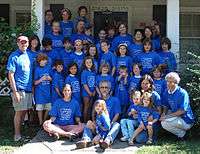Temple Shalom of Northwest Arkansas
Temple Shalom of Northwest Arkansas is a small, mixed-denomination liberal, volunteer-run congregation that serves as the focal point for Jewish life in the Fayetteville, Arkansas area. While Temple Shalom is an affiliate of the Union for Reform Judaism, as the only Jewish congregation in Fayetteville, Temple Shalom supports a variety of activities and services for Jews of all backgrounds.


Early history
On January 21, 1981 about 30 people attended a meeting in Fayetteville, Arkansas with Rabbi Lawrence Jackofsky of the Southwest Council, Union of American Hebrew Congregations of Dallas. An overwhelming majority of those present favored the establishment of a Jewish congregation. On February 23, 1981 the congregation was formed and named Temple Shalom.[1]
In March 1981, Rabbi Norbert L. Rosenthal, emeritus rabbi of Temple Israel in Tulsa, Oklahoma was invited to serve as the first rabbi. At the consecration ceremony on April 25, 1981, the new board officers were installed. Temple Shalom arranged to use the Unitarian Universalist Fellowship hall for monthly services. Weekly Religious School, organized and conducted by parent volunteers took place at the Sam Barg Hillel House at 607 Storer. Lay leaders conducted weekly Friday night services.
Building history
In 1999, the University of Arkansas Hillel began leasing a building from the University at 608 N. Storer Avenue in Fayetteville. Temple Shalom leased space in this larger building. Larger gatherings continued to take place at the neighboring Unitarian Universalist Fellowship. Religious School was held every Sunday morning.
In 2004, when Temple Shalom was growing out of that building, some members from the Rogers and Bentonville area decided to form a new congregation in Bentonville, Congregation Etz Chaim,[2] temporarily easing the need for Temple Shalom to move again to a bigger facility.
By 2005, Temple Shalom had again grown enough to need its own building. The membership included nearly 60 families. There were about 30 children attending Religious School, several of whom became Bar and Bat Mitzvah each year. The project to acquire a building for Fayetteville's first synagogue was launched headed by the synagogue's president. Certain members proposed donating seed money for the project. The temple briefly considered buying and renovating an E. Fay Jones house, but those plans fell through.
In 2006, local builder, Fadil Bayyari, a Palestinian Muslim from Springdale, Arkansas proposed to build a new building for Temple Shalom at his cost, a savings of an estimated 20% of the total cost of the project. Mr. Bayyari's offer spurred much interest in the local and national press.[3][4][5][6][7]
In 2007 Temple Shalom purchased a little less than an acre of land at the corner of Sang Avenue and Cleveland Street to create a combined Temple Shalom and University of Arkansas Hillel home and to house a multicultural library.
On October 14, 2007, there was a ground breaking ceremony attended by religious leaders from a wide variety of faith traditions.[8][9] Later that month, the former Sam Barg Hillel House at 607 Storer was sold to the University of Arkansas. The leased UA building at 608 Storer continues to serve until the new building is built and becomes habitable.
Clergy
Until 2006, Temple Shalom was served by a variety of visiting rabbis, student rabbis, and cantors, who made monthly visits to Fayetteville during the academic year.[10]
Lay leaders from the community also played a prominent role. In 2006, University of Arkansas professor of philosophy Jacob Adler, having newly acquired his rabbinical ordination, became the first resident rabbi.[11] Temple Shalom holds monthly Friday evening Shabbat services, led by Rabbi Adler and weekly Religious School during the school year led by parents and other volunteers from the local Jewish community.
References and notes
- ↑ ISJL : Digital Archive: Fayetteville, Arkansas
- ↑ Congregation Etz Chaim - Building a Jewish Community in Northwest Arkansas
- ↑ In Brief - washingtonpost.com
- ↑ NWAnews.com :: Northwest Arkansas' News Source
- ↑ Here and Now : Building Synagogue Builds Bridges - 16 October 2007
- ↑ Boston Jew and West Bank Muslim Build a Temple, and Bridges, in Arkansas - New York Times
- ↑ http://www.kfsm.com/videobeta/watch/?watch=89cdd5eb-1a1c-4456-ab05-7cce2693cdf6&src=front
- ↑ Arkansas Blog : If they build it
- ↑ The Morning News: Religion : Building A Dream
- ↑ http://ozarkswatch.missouristate.edu/ozarkswatch_complete_list_no_pics.pdf A History of the Jewish Community of Fayetteville (Leon Joseph Rosenberg)
- ↑ NWAnews.com :: Northwest Arkansas' News Source
External links
- Temple Shalom of Northwest Arkansas
- A Temple Of Peace
- Wikimapia
- Temple Shalom of Northwest Arkansas is at coordinates 36°04′26″N 94°11′22″W / 36.073973°N 94.189321°W